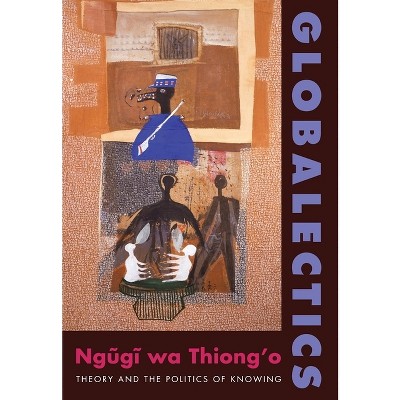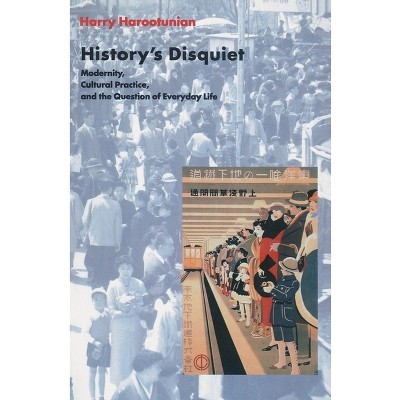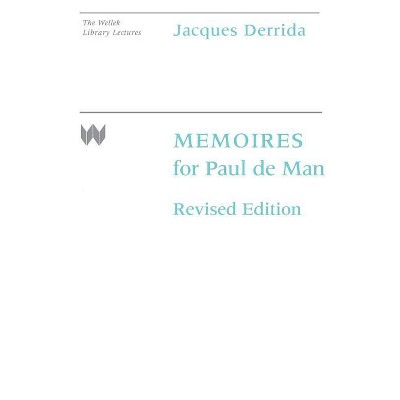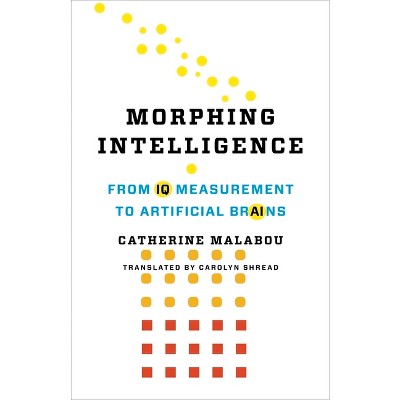Postprint - (Wellek Library Lectures) by N Katherine Hayles (Paperback)

$26.49 when purchased online
Target Online store #3991
About this item
Highlights
- Since Gutenberg's time, every aspect of print has gradually changed.
- About the Author: N. Katherine Hayles is distinguished research professor of English at the University of California, Los Angeles, and James B. Duke Professor of Literature Emerita at Duke University.
- 248 Pages
- Literary Criticism, Books & Reading
- Series Name: Wellek Library Lectures
Description
About the Book
"Since Gutenberg's time, every aspect of print has gradually changed. But the advent of computational media has exponentially increased the pace, transforming how books are composed, designed, edited, typeset, distributed, sold, and read. N. Katherine Hayles traces the emergence of what she identifies as the postprint condition, exploring how the interweaving of print and digital technologies has changed not only books but also language, authorship, and what it means to be human. Hayles considers the ways in which print has been enmeshed in literate societies and how these are changing as some of the cognitive tasks once performed exclusively by humans are now carried out by computational media. Interpretations and meaning-making practices circulate through transindividual collectivities created by interconnections between humans and computational media, which Hayles calls cognitive assemblages. Her theoretical framework conceptualizes innovations in print technology as redistributions of cognitive capabilities between humans and machines. Humanity is becoming computational, just as computational systems are edging toward processes once thought of as distinctively human. Books in all their diversity are also in the process of becoming computational, representing a crucial site of ongoing cognitive transformations. Hayles details the consequences for humanities publications through interviews with scholars and university press professionals and considers the cultural implications in readings of two novels, The Silent History and The Word Exchange, that explore the postprint condition. Spanning fields including book studies, cultural theory, and media archeology, Postprint is a strikingly original consideration of the role of computational media in the ongoing evolution of humanity"--Book Synopsis
Since Gutenberg's time, every aspect of print has gradually changed. But the advent of computational media has exponentially increased the pace, transforming how books are composed, designed, edited, typeset, distributed, sold, and read. N. Katherine Hayles traces the emergence of what she identifies as the postprint condition, exploring how the interweaving of print and digital technologies has changed not only books but also language, authorship, and what it means to be human.
Hayles considers the ways in which print has been enmeshed in literate societies and how these are changing as some of the cognitive tasks once performed exclusively by humans are now carried out by computational media. Interpretations and meaning-making practices circulate through transindividual collectivities created by interconnections between humans and computational media, which Hayles calls cognitive assemblages. Her theoretical framework conceptualizes innovations in print technology as redistributions of cognitive capabilities between humans and machines. Humanity is becoming computational, just as computational systems are edging toward processes once thought of as distinctively human. Books in all their diversity are also in the process of becoming computational, representing a crucial site of ongoing cognitive transformations. Hayles details the consequences for the humanities through interviews with scholars and university press professionals and considers the cultural implications in readings of two novels, The Silent History and The Word Exchange, that explore the postprint condition. Spanning fields including book studies, cultural theory, and media archeology, Postprint is a strikingly original consideration of the role of computational media in the ongoing evolution of humanity.Review Quotes
N. Katherine Hayles presents new explorations of typesetting, scholarly editing, and radical recent book projects, using these to unite aspects of her theories of computation, textual materialities, and (un)thought. The profound insights in Postprint show what print is becoming, not just as a medium or cultural phenomenon, but as cognition.--Nick Montfort, author of Golem
Postprint may be enjoyed simply as a series of well-selected, vividly rendered case studies detailing recent convergences between books, human readers and writers, and computational technologies. But it is much more than that. With her hallmark clarity, Hayles lays out a whole new conceptual framework--the cognitive-assemblage approach--in terms of which postprint may be grasped as a moment of unprecedented symbiosis across cognitive media: the 'becoming computational of books and people together.'--James F. English, author of The Global Future of English Studies
Claiming that computational media have brought to bear new, nonhuman forms of cognition, Postprint offers a series of compelling examples and showcases an empirical method that will be widely emulated by literary and media studies scholars interested in exploring the history and future of print culture.--Lee Konstantinou, author of Cool Characters: Irony and American Fiction
About the Author
N. Katherine Hayles is distinguished research professor of English at the University of California, Los Angeles, and James B. Duke Professor of Literature Emerita at Duke University. Her books include How We Became Posthuman: Virtual Bodies in Cybernetics, Literature, and Informatics (1999) and Unthought: The Power of the Cognitive Nonconscious (2017).Dimensions (Overall): 8.4 Inches (H) x 5.5 Inches (W) x .8 Inches (D)
Weight: .65 Pounds
Suggested Age: 22 Years and Up
Series Title: Wellek Library Lectures
Sub-Genre: Books & Reading
Genre: Literary Criticism
Number of Pages: 248
Publisher: Columbia University Press
Format: Paperback
Author: N Katherine Hayles
Language: English
Street Date: February 16, 2021
TCIN: 94139448
UPC: 9780231198257
Item Number (DPCI): 247-37-3103
Origin: Made in the USA or Imported
Shipping details
Estimated ship dimensions: 0.8 inches length x 5.5 inches width x 8.4 inches height
Estimated ship weight: 0.65 pounds
We regret that this item cannot be shipped to PO Boxes.
This item cannot be shipped to the following locations: American Samoa (see also separate entry under AS), Guam (see also separate entry under GU), Northern Mariana Islands, Puerto Rico (see also separate entry under PR), United States Minor Outlying Islands, Virgin Islands, U.S., APO/FPO
Return details
This item can be returned to any Target store or Target.com.
This item must be returned within 90 days of the date it was purchased in store, shipped, delivered by a Shipt shopper, or made ready for pickup.
See the return policy for complete information.
Trending Fiction


$11.98 - $23.49
was $17.99 - $32.99 New lower price
Save $5 when you spend $25 on select books
5 out of 5 stars with 10 ratings

$13.88 - $15.00
Select items on sale
Save $5 when you spend $25 on select books
4.7 out of 5 stars with 618 ratings

$11.88
MSRP $12.99
Save $5 when you spend $25 on select books
4.7 out of 5 stars with 14 ratings

$12.54
MSRP $22.00
Save $5 when you spend $25 on select books
4.7 out of 5 stars with 20 ratings






